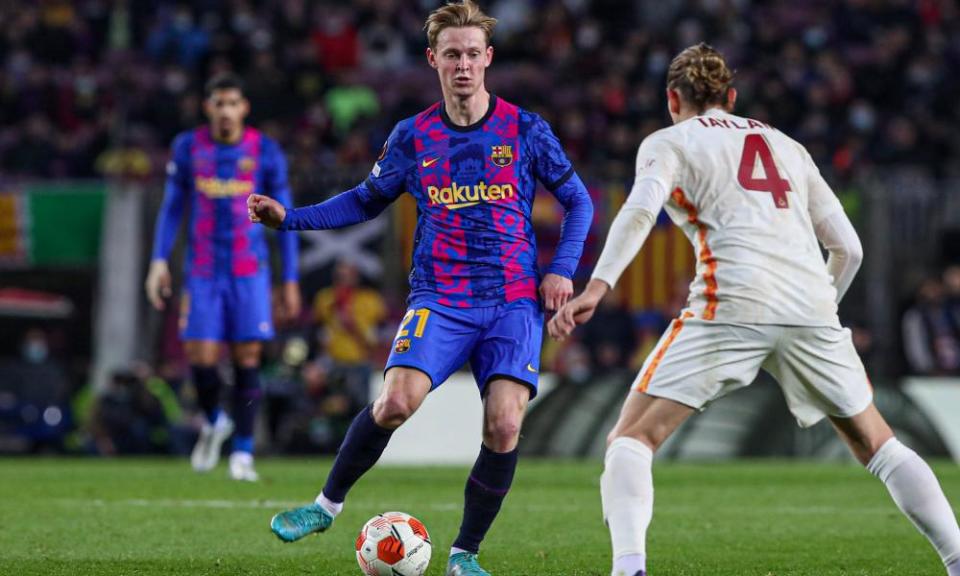How Frenkie de Jong could fit in at Erik ten Hag’s Manchester United

Erik ten Tag is confident his marquee summer target, Frenkie de Jong, will soon be confirmed as a Manchester United player in what is expected to be a total €85m deal. Given that the midfielder was reluctant to leave Barcelona and is one of Europe’s finest talents, De Jong’s arrival could prove a coup. He is versatile, too. In three seasons at Ajax the 25-year-old operated 12 times as a centre-back, 50 as a defensive midfielder, and 12 in a more central berth. After arriving at Barcelona in July 2019, he again played in central defence (nine times), as a holding player on 36 occasions and a central midfielder 93.
So, how could Ten Hag utilise De Jong and who else could the manager select in his XI if we include other current targets: Feyenoord’s Tyrell Malacia, Christian Eriksen (a free agent), and Antony and Lisandro Martínez of Ajax?
Related: Men’s transfer window summer 2022 – all deals from Europe’s top five leagues
Malacia is close to signing but the prospect of Eriksen joining depends on his preferred destination, with Brentford and Leicester being considered by the Dane, too. And regarding Martínez and Antony, although Ten Hag would like to recruit them, United recognise deals for either are difficult.
At Ajax Ten Hag favoured 4-3-3, with 4-3-1-2 a backup towards the end of last season. Below are potential versions of these plus a further alignment, should Ten Hag choose to tweak his strategy.
Ten Hag’s dream 4-3-3: De Gea; Dalot, Martínez, Maguire, Malacia; Fernandes (captain), McTominay, De Jong; Eriksen, Ronaldo, Antony.
Ten Hag fields a “defensive” or “attacking” 4-3-3, according to the opposition and what may be required. In a proactive 4-3-3, De Jong’s geometric destructiveness is complemented by the more protective characteristics of Scott McTominay and Bruno Fernandes’s penchant to flit between the lines. The at-times clumsy Harry Maguire could be risked alongside Martínez, who would be expected to be a regular and whose diminutive (for a centre-back) 5ft 9in should not be mistaken for a man unaccomplished in duels. At left-back, Malacia’s thirst for a tackle, afterburner-like speed and trickery in possession mean in time Luke Shaw could be edged out. Diogo Dalot’s selection is close: a reflection of what may be a season-long vie with Aaron Wan-Bissaka at right-back unless Victor Lindelöf and Brandon Williams (who have operated there) emerge as a surprise go-to.
Further ahead, Antony would edge out Jadon Sancho and Marcus Rashford, who needs to improve ball-carrying, vision and his goal and assist returns which were four and two in 25 appearances in 2021-22 – against the Brazil international’s nine and four in 23 in the Eredivisie. Eriksen would be the most withdrawn of the front three with Cristiano Ronaldo playing through the middle after scoring 18 goals in 30 Premier League appearances during last season’s return to the division. If there are doubts that his 37-year-old legs can marry with Ten Hag’s dynamic style the hardly pacier, inch-taller Sébastien Haller was the focal-point of Ajax’s last title triumph under the manager.
This lineup has Fernandes as the captain – the thinking here that Ten Hag will decide Maguire is no longer an automatic pick and hand the armband to one of United’s few on-field generals.

A 4-3-1-2 if only De Jong and Malacia join: De Gea; Wan-Bissaka, Varane, Maguire Malacia; McTominay, De Jong, Fred; Fernandes; Ronaldo, Rashford
In this configuration, De Jong is the more deep-lying of him and Fred to make the most of the Dutchman’s long-range passing and penchant for ball-carrying that can disrupt lines. The Brazilian, who was more dynamic in the later part of last season, would operate alongside Fernandes and De Jong to form a fluid match-breaking trio, with McTominay the “destroyer”. At the back, Maguire’s experience would hopefully aid the blossoming of Raphaël Varane’s silkier style. Hopefully, because the World Cup-winner has struggled in United colours, seeming to move in slow motion, a feistiness deficit also costing goals. At this juncture, the right-back position is a Ten Hag headache: Wan-Bissaka has to increase his attacking thrusts, Dalot his reading of rearguard play, so the former may be better suited to this slightly more defensive shape. Rashford, dire last season, is chosen because his pace and directness compensate for Ronaldo’s difficulty in maintaining 90-minute zest levels. To not be taken off, though, the United academy product has to set his satnav to miss the cul-de-sacs he too often runs up.
A 4-1-4-1 option: De Gea; Dalot, Varane, Maguire, Shaw; De Jong; Rashford, Van de Beek, Fred, Sancho; Fernandes
This is Pep Guardiola’s familiar formation for Manchester City and has often featured a false 9, a tactic Ten Hag may deploy given he lacks a prolific back-up centre-forward when Ronaldo requires a breather. So, where Rodri is the ‘1’ in front of the City defence, De Jong is placed in this string-puller role by Ten Hag, the manager also asking his star signing to be as adept as the Spaniard in anticipating and stifling any opponent’s foray. Fernandes’s cute football brain makes him the “ghost” lone striker, and Donny van de Beek is given a chance to establish himself as a viable choice by being asked to dovetail with De Jong as he did under Ten Hag at Ajax for two years (2017-19). In defence Varane is again named alongside Maguire and Shaw replaces Malacia because the England left-back is sure to respond positively if doubted by Ten Hag (as the 26-year-old did under a previous manager, José Mourinho, and Malacia may take time to adjust.

 Yahoo Movies
Yahoo Movies 